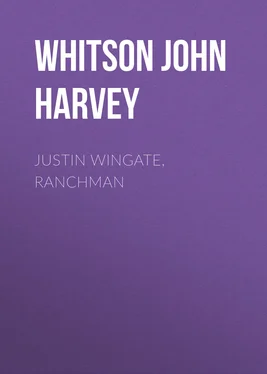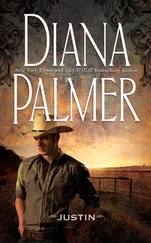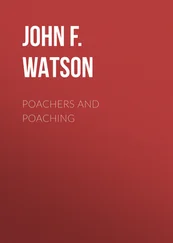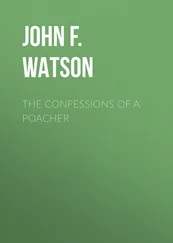John Whitson - Justin Wingate, Ranchman
Здесь есть возможность читать онлайн «John Whitson - Justin Wingate, Ranchman» — ознакомительный отрывок электронной книги совершенно бесплатно, а после прочтения отрывка купить полную версию. В некоторых случаях можно слушать аудио, скачать через торрент в формате fb2 и присутствует краткое содержание. Жанр: foreign_sf, foreign_antique, foreign_prose, на английском языке. Описание произведения, (предисловие) а так же отзывы посетителей доступны на портале библиотеки ЛибКат.
- Название:Justin Wingate, Ranchman
- Автор:
- Жанр:
- Год:неизвестен
- ISBN:нет данных
- Рейтинг книги:3 / 5. Голосов: 1
-
Избранное:Добавить в избранное
- Отзывы:
-
Ваша оценка:
- 60
- 1
- 2
- 3
- 4
- 5
Justin Wingate, Ranchman: краткое содержание, описание и аннотация
Предлагаем к чтению аннотацию, описание, краткое содержание или предисловие (зависит от того, что написал сам автор книги «Justin Wingate, Ranchman»). Если вы не нашли необходимую информацию о книге — напишите в комментариях, мы постараемся отыскать её.
Justin Wingate, Ranchman — читать онлайн ознакомительный отрывок
Ниже представлен текст книги, разбитый по страницам. Система сохранения места последней прочитанной страницы, позволяет с удобством читать онлайн бесплатно книгу «Justin Wingate, Ranchman», без необходимости каждый раз заново искать на чём Вы остановились. Поставьте закладку, и сможете в любой момент перейти на страницу, на которой закончили чтение.
Интервал:
Закладка:
Mary Jasper hastened to call on Lucy Davison; and in doing so made the acquaintance of that most interesting person, Miss Pearl Newcome, Davison’s housekeeper. Miss Newcome had passed the beauty stage, if indeed she had ever dwelt at all in that delectable period which should come by right to every member of the sex; but she still cherished the romantic illusions of her earlier years, and kept them embalmed, as it were, in sundry fascinating volumes, which were warded and locked in her trunk up stairs. She brought these out at psychological moments, smelling sweetly of cedar and moth balls, and read from them, to Mary’s great delight; for there never were such charming romances in the world, and never will be again, no matter who writes them. Some of them were in the form of pamphlets, yellow and falling to pieces; others were in creaky-backed books; and still others, and these the most read, in cunning bindings of Miss Newcome’s own contriving.
Sitting on the flat lid of the trunk, with one foot tucked under her for comfort, while Mary crouched on the floor with her rose-leaf cheeks in her palms, Pearl Newcome would read whole chapters from “Fanny the Flower Girl, or the Pits and Pitfalls of London,” from “Lady Clare, or Lord Marchmont’s Unhappy Bride,” from “The Doge’s Doom, or the Mysterious Swordsman of Venice,” and many others. The mysterious swordsman in the “Doge’s Doom” was especially entrancing, for he went about at night with a black mask over his face, and made love and fought duels with the greatest imaginable nonchalance. It taxed the memory merely to keep count of his many loves and battles, and it was darkly hinted that he was a royal personage in disguise.
“The Black Mask’s scabbard clanked ominously as he sprang from the gondola to the stone arches below the sombre building, while the moonlight was reflected from his shining coat of mail and from the placid waters of the deep lagoon, showing in the pellucid waves alike the untamed locks that hung about his shoulders and the white frightened face of the slender, golden-haired maiden who leaned toward him with palpitating bosom from the narrow, open window above him.”
When that point was reached Mary clasped her hands tightly across her knees and rocked in aching excitement; for who was to know whether the Black Mask would succeed in getting the lovely maiden out of the clutches of the foul doge who held her a prisoner, or whether some guard concealed in a niche in the wall would not pounce out, having been set there by the shrewd doge for the purpose, and slice the Black Mask’s head off, in spite of the protecting coat of mail?
Aside from her duties as housekeeper, which she never neglected, there was one other thing that could cause Pearl Newcome to surrender voluntarily the joys of that perch on the trunk lid in the midst of her redolent romances with Mary Jasper for an appreciative listener, and that was the voice of Steve Harkness, the ranch foreman. The attraction of the printed page palled when she heard Harkness’s heavy tones, and stopping, with her finger between the leaves, she would step to the window; and sometimes, to Mary’s regret, would go down stairs, where she would cut out a huge triangle of pie and place it on the kitchen table.
Harkness was big and jovial, and in no manner resembled the Black Mask, who was slender, lithe, had a small supple wrist, hair of midnight blackness, and “a voice like the tinkle of many waters.” Harkness’s voice was big and heavy, and his wrist was large and red. But he was usually clean-shaven, scented himself sweetly with cinnamon drops, and was altogether very becoming, in the eyes of Pearl Newcome. And she knew he liked pie. Sometimes Pearl came back to the trunk and continued the dropped romance. That was when Harkness was in a hurry and could not linger in the kitchen to joke and laugh with her. But if time chanced to hang heavily on his hands and no troublesome cowboy or refractory steer claimed his attention, she did not return at all, and Mary, tired of waiting, crept down in disappointment.
Delightful as Mary Jasper and Justin Wingate found the people of the new ranch, Curtis Clayton secluded himself more than ever with his books and his writing, and was not to be coaxed out of his shell even by Justin’s stories of Ben’s marvellous acrobatic and equestrian feats and of Lucy’s brightness and clever talk.
Yet he was drawn out one day by a summons that could not be disobeyed. Harkness had been hurled against the new wire corral by a savage broncho, and Clayton’s services as a surgeon were demanded. He never refused a call like that.
He found Harkness sitting in the kitchen of the ranch house, to which he had come as to a shelter, with Pearl Newcome bending over him, a camphor bottle in one of her hands and a blood-stained cloth in the other. Davison, Fogg, and several cowboys, stood about in helpless awkwardness. Harkness’s face looked white and faint, in spite of its red tan. The sleeve of his flannel shirt had been rolled to the shoulder and a bloody bandage was wound round the arm.
“Nothin’ to make a fuss about,” he said, when he saw Clayton. “I got slung up ag’inst the barbed wire and my arm was ripped open. It’s been bleedin’ some, but that’s good fer it.”
“I shall have to take a number of stitches,” Clayton announced, when he had examined and cleansed the wound. He opened a pouch of his saddle-bags.
“No chloryform ner anything of that kind fer me,” said Harkness, regarding him curiously. “Jist go ahead with your sewin’.”
Clayton obeyed; while Harkness, setting a lighted cigarette between his teeth, talked and laughed with apparent nonchalance.
Brought thus into close contact with the people of the ranch, the shell of Clayton’s exclusiveness was shattered. After that, daily, for some time, he rode or walked over to the ranch house to see how his patient was doing, or Harkness came over to see him. And he found that these people were good to know. They lessened the emptiness which had gnawed. They were human beings, with wholly human hearts. And he needed them quite as much as they needed him.
CHAPTER VI
WHEN LOVE WAS YOUNG
Justin shot up into a tall youth; he was beginning to feel that he was almost a man; and love had come to him, as naturally and simply as the bud changes into the flower. It flushed his face, as he came with Lucy Davison up the path to the arbor seat in the cottonwoods, after a stroll by the stream. Planted when the ranch was established, the trees were now a cool and screening grove. Justin had made for her a crown of the cottonwood leaves, and had set it on her brown hair. As they walked along, hand in hand, he looked at her now and then, with the light of young love in his eyes. He was sure he had never seen a girl so beautiful and it gave him a strange and delightful pleasure just to look at her.
“Tell me more about Doctor Clayton,” she said, dropping down upon the arbor seat. “You told me about that scorched photograph. What is that woman to him, anyway?”
“I don’t know,” he said, as he sat down by her.
“I think she must have been his sweetheart.”
“Just because he couldn’t burn her picture?” “Because he came down here in that queer way and has stayed here ever since. Something happened to separate them.”
“If that is so I ought to be sorry, I suppose, but I can’t; it was a good thing for me; it kept me here, and gave me a chance to—get an education.”
“And we do need a doctor here,” she said, with unnecessary emphasis.
“If he hadn’t come, I’m afraid I should have been sent away when Mr. Wingate died, and then I shouldn’t ever have—met you.”
“Oh, you might have!” she declared, tossing her crowned head coquettishly.
Читать дальшеИнтервал:
Закладка:
Похожие книги на «Justin Wingate, Ranchman»
Представляем Вашему вниманию похожие книги на «Justin Wingate, Ranchman» списком для выбора. Мы отобрали схожую по названию и смыслу литературу в надежде предоставить читателям больше вариантов отыскать новые, интересные, ещё непрочитанные произведения.
Обсуждение, отзывы о книге «Justin Wingate, Ranchman» и просто собственные мнения читателей. Оставьте ваши комментарии, напишите, что Вы думаете о произведении, его смысле или главных героях. Укажите что конкретно понравилось, а что нет, и почему Вы так считаете.












